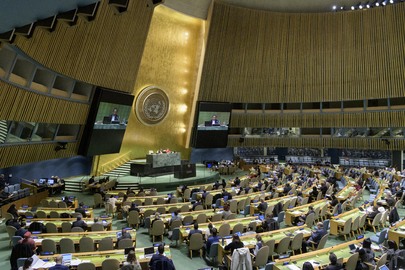Investment in organic farming, sustainable textiles and eco-tourism is helping mountain communities in Central Asia adapt to global warming, the UN’s Food and Agriculture Organization (FAO) said on Thursday, urging greater support for regions often overlooked in climate discussions.
Mountain residents relying on family farming are among the world’s poorest people, said the agency’s Director-General Qu Dongyu.
Speaking at the International Conference of the Global Mountain Dialogue for Sustainable Development in Bishkek, the FAO chief explained that many alpine people struggle with food insecurity, as climate change, environmental degradation and unsustainable use of resources make it harder to access clean water, food and fertile soils.
Mountain communities, the stewards of mountain resources, have great potential for climate-resilient development.
Kyrgyzstan, a Central Asian nation that is home to some of the world’s most diverse and significant mountain ecosystems, is gearing up to host a Global Mountain Summit in 2027.
More resilient systems
“Mountain communities, the stewards of mountain resources, have great potential for climate-resilient development by transforming to more efficient, more inclusive, more resilient and more sustainable agrifood systems,” Mr. Qu said, insisting that the protection of mountain ecosystems is a global responsibility.
More than two billion people globally rely on freshwater from glaciers – a fragile supply endangered by rising temperatures and melting snowcaps, he said.
There has been some progress – but mountain regions remain strained and increasingly impacted by human-induced climate change, biodiversity loss, soil erosion and land degradation.
Boosting impact
FAO has worked in Kyrgyzstan since 2009 to help the country withstand mounting pressure on its ecosystems. The aims include achieving sustainable food security and supporting sustainable land and forest management.
The UN General Assembly in late 2022 adopted the Five Years of Action for the Development of Mountain Regions to “enhance the awareness of the international community of the problems of mountain countries” and strengthen global efforts to address the challenges these regions face. The plan will extend until 2027.
Source of original article: United Nations (news.un.org). Photo credit: UN. The content of this article does not necessarily reflect the views or opinion of Global Diaspora News (www.globaldiasporanews.com).
To submit your press release: (https://www.globaldiasporanews.com/pr).
To advertise on Global Diaspora News: (www.globaldiasporanews.com/ads).
Sign up to Global Diaspora News newsletter (https://www.globaldiasporanews.com/newsletter/) to start receiving updates and opportunities directly in your email inbox for free.




























